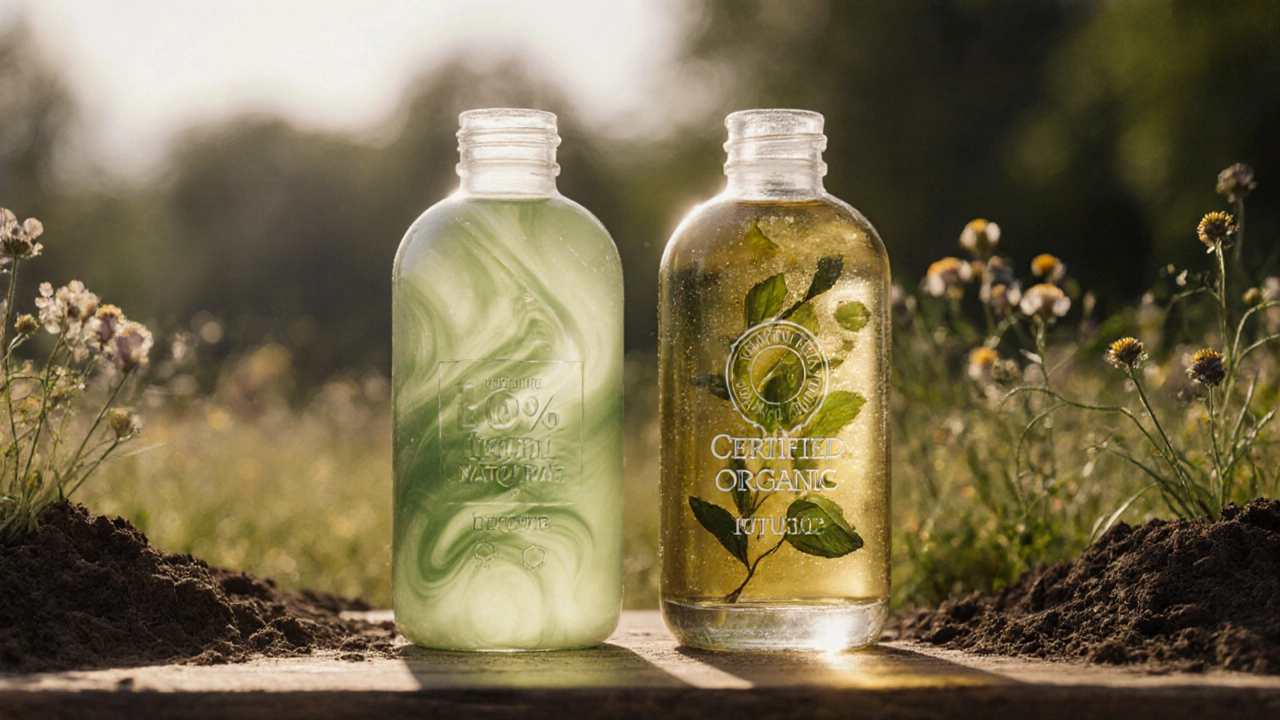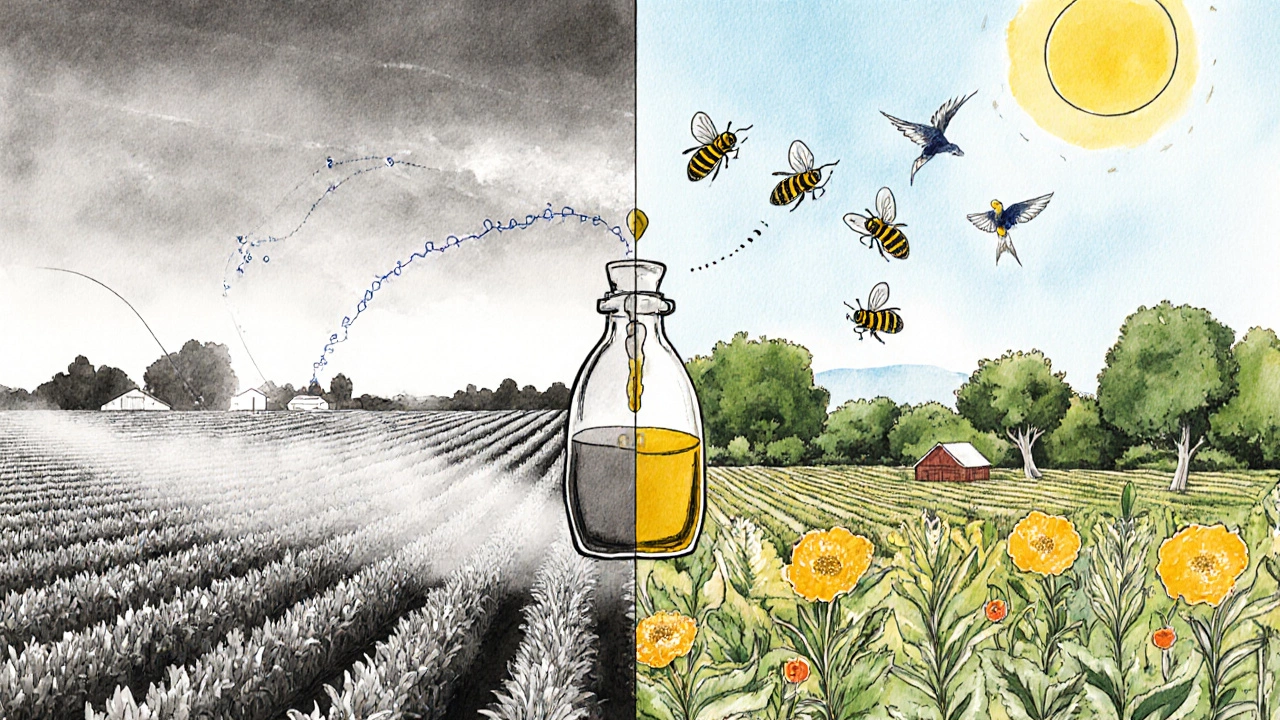Is 100% Natural the Same as Organic in Skincare?
 Nov, 8 2025
Nov, 8 2025
Organic Certification Checker
You see it on every bottle: natural, organic, clean, pure. But if a product says it’s 100% natural, does that mean it’s also organic? The answer isn’t what most people think. And if you’re spending extra money on skincare labeled ‘organic,’ you deserve to know the difference-before you buy.
Natural doesn’t mean organic
When a brand says a product is ‘100% natural,’ it usually means the ingredients came from plants, minerals, or animals-not synthetic chemicals. That sounds great. But here’s the catch: ‘natural’ isn’t regulated. A company can call a product natural even if 99% of it is water and the last 1% is a pesticide-treated plant extract harvested from a monocrop farm using chemical fertilizers. That’s still ‘natural’ under most labeling laws. Organic, on the other hand, is a legal term. In New Zealand, the U.S., the EU, and Canada, organic certification requires strict rules. For a skincare ingredient to be certified organic, the plant must be grown without synthetic pesticides, herbicides, or genetically modified organisms (GMOs). The soil must be free of banned chemicals for at least three years before harvest. Even the water used in processing matters. Organic certification isn’t just about the final ingredient-it’s about the entire lifecycle.What does ‘organic’ actually require?
To be labeled organic in skincare, the product must meet one of two standards:- At least 95% of the ingredients (by weight, excluding water and salt) are certified organic.
- The remaining 5% must be on an approved list of non-organic substances that can’t be sourced organically (like certain clays or minerals).
Why the confusion exists
Brands use ‘natural’ because it sounds safer and more wholesome. It’s easier to say than ‘certified organic by Ecocert.’ And honestly? Most shoppers don’t dig deeper. A 2024 survey by the New Zealand Consumer Trust Institute found that 68% of people believe ‘natural’ and ‘organic’ mean the same thing. That’s a problem. Think about it this way: Aloe vera gel can be natural if it’s squeezed from a plant. But if that plant was sprayed with glyphosate last season? It’s still ‘natural’-but it’s not safe. Organic aloe vera means the plant was grown without that chemical at all. The difference isn’t subtle. It’s the difference between avoiding toxins and just hoping they’re not there.
What’s in your moisturizer?
Let’s break down two common ingredients you’ll find in skincare:- Jojoba oil: If it’s labeled natural, it could come from a farm using synthetic fertilizers. If it’s organic, the jojoba plants were grown in biodiverse soil, rotated with other crops, and harvested without chemical sprays.
- Lavender essential oil: Natural lavender oil might be distilled from plants treated with neonicotinoids-pesticides linked to bee decline. Organic lavender oil? No such chemicals allowed. Ever.
Can a product be organic without being 100% natural?
Yes. And this is where things get tricky. Some organic-certified products contain a tiny amount of non-natural ingredients that are necessary for safety or stability. For example:- Sodium benzoate (a preservative) may be included to prevent mold in water-based products.
- Phytic acid, derived from rice bran, might be used to stabilize vitamin C.

How to spot the real thing
Here’s how to cut through the noise:- Look for a certification logo-USDA, COSMOS, Ecocert, or NZ Organic. If it’s not there, don’t trust the claim.
- Check the ingredient list. Organic ingredients will be marked with the word ‘organic’ next to them (e.g., ‘organic aloe vera juice’).
- Don’t be fooled by phrases like ‘made with organic ingredients.’ That means only 70% are organic. Not the same as ‘certified organic.’
- Search the brand’s website for their certification documents. Reputable brands make them public.
Why it matters beyond the label
Choosing organic isn’t just about what you put on your skin. It’s about what’s happening in the fields where your ingredients are grown. Organic farming supports soil health, protects pollinators, reduces water pollution, and avoids toxic runoff into rivers. In New Zealand, where clean water and sustainable land use are core values, choosing certified organic skincare is a small but meaningful act. It’s also about your body. Studies from the Environmental Working Group show that chemicals like phthalates and parabens-common in non-organic cosmetics-can disrupt hormones. These aren’t found in certified organic products. You’re not just avoiding synthetic smells-you’re avoiding endocrine disruptors.What to do next
If you’ve been buying ‘natural’ products thinking they’re organic, it’s time to check your labels. Look for the certification. Ask the brand if they’re certified. If they can’t show proof, they’re not organic. And if they say ‘natural’ means the same thing? They’re either misinformed or misleading you. Start small. Swap out one product-your cleanser or moisturizer-for a certified organic version. Notice how your skin reacts. Many people report less irritation, fewer breakouts, and a calmer complexion within weeks. Not because it’s ‘clean’ or ‘pure’-but because it’s free of hidden toxins. The truth? 100% natural doesn’t guarantee safety. Organic does.Can a product be natural but not organic?
Yes. A product can be 100% natural and still use ingredients grown with synthetic pesticides, herbicides, or GMOs. Natural only means the ingredients come from nature-not that they were grown sustainably or without chemicals. Organic means the ingredients were grown under strict, certified rules that ban those chemicals entirely.
Is organic skincare better for sensitive skin?
Often, yes. Organic skincare avoids synthetic fragrances, parabens, phthalates, and sulfates-all common irritants in conventional products. While ‘natural’ products can still contain essential oils or plant extracts that trigger reactions, certified organic brands tend to use gentler, lower-risk formulations and avoid known allergens. Many people with eczema or rosacea see improvement after switching.
Why are organic skincare products more expensive?
Organic ingredients cost more because they’re grown without synthetic inputs, require more labor, and have lower yields. Certification involves inspections, paperwork, and testing. Small organic farms can’t benefit from bulk industrial pricing. You’re paying for ethical farming, not just a label. But when you consider the long-term cost of skin irritation or environmental damage, it’s an investment.
Do organic skincare products expire faster?
They can, because they often avoid synthetic preservatives like parabens. But certified organic brands use approved natural preservatives like radish root ferment or sodium benzoate in safe amounts. Always check the PAO (period after opening) symbol on the packaging. Store products in cool, dark places to extend shelf life. Refrigerating serums with vitamin C or retinol helps too.
Can I trust ‘plant-based’ or ‘botanical’ labels?
Not alone. ‘Plant-based’ and ‘botanical’ are marketing terms with no legal definition. They don’t guarantee organic, non-GMO, or pesticide-free sourcing. Always look for certified organic logos. If the brand doesn’t provide certification details, assume the ingredients may have been grown with chemicals.
